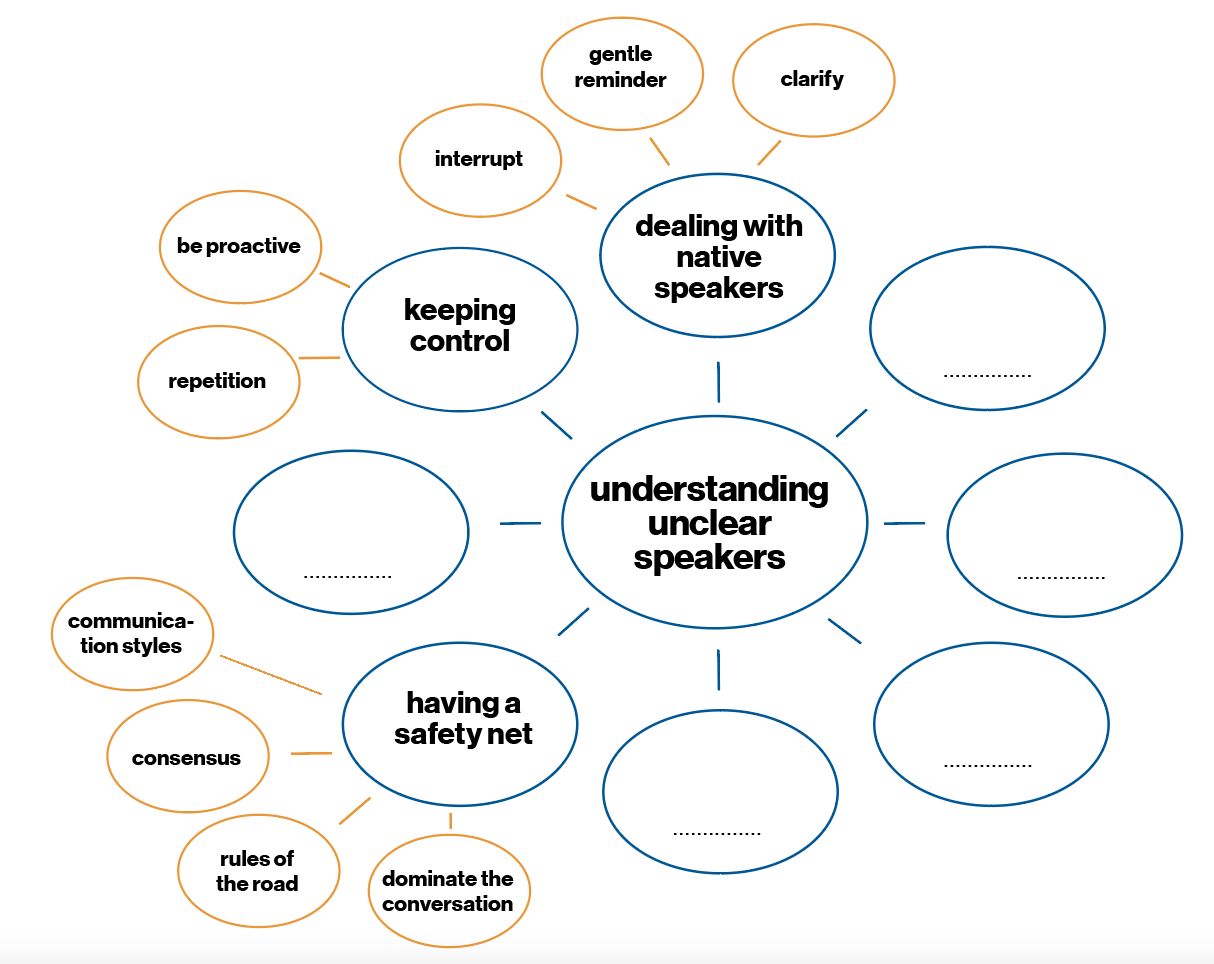In the international business arena, we meet people with very different cultural and linguistic backgrounds. Their levels of English vary, as do their accents and styles of speaking. It is not always easy for people to understand each other, especially when speaking on a video call.
It can be embarrassingpeinlichembarrassing if you continually have to interrupt the other person to tell them that you are not following what they are saying. But there are some simple techniques that can help when it is difficult to understand someone. Let’s look at some of them here.
1. Setting a good example
Speak as you would like to be spoken to:
- Speak slowly and clearly, but not too slowly. Speaking very slowly can send your listeners to sleep, so vary your speed.
- Use pauses. They help your listeners to to digest sth.etw. verdauen; hier: verarbeitendigest more easily what you are saying.
- to stress sth.etw. betonenStress the most important word or phraseAusdruck, Formulierungphrase in a sentence. This will make it easy for your listeners to to take sth. on boardhier: etw. aufnehmentake on board your key ideas.
- to articulate sth.etw. deutlich aussprechenArticulate your words. This makes everything you say clearer to your listeners. It prevents you from “to swallow sth.etw. verschluckenswallowing” sounds, which makes it difficult for your listeners to make out what you are saying.
If you set a good example, your speaking partners will often try to imitate your style and approachVorgehensweise; hier: Sprechverhaltenapproach. And this makes your life much easier.
2. Keeping control
It is important to keep control of the conversation:
- If someone speaks too quickly, ask them to slow down.
- If they speak too quietly, ask them to to speak uplauter sprechenspeak up.
- If you want to write something down, ask them to to spell sth.etw. buchstabierenspell words for you.
- Ask the other person to repeat anything you do not hear properly. And repeat key words or phrases they said to make sure you have understood.
Do not to hesitatezögernhesitate to do these things. Sometimes, we hope we will be able to to catchhier: etw. verstehencatch the meaning if we continue to listen. But eventually, we lose the threadFadenthread of the conversation. It’s then more difficult, and even embarrassing, to go back to the beginning.
3. Listening carefully
If you listen carefully, you will improve both your understanding and the flow of the dialogue:
- Show interest by to nodnickennodding or by using encouraginghier: ermunterndencouraging sounds or words. These signals tell your partner that you have understood and want them to continue.
- Allow silence so that the other person can collect their thoughts. If you to jump in (ifml.)hier: etw. (zum Thema) sagenjump in too quickly, you may be interrupting a key message.
- Ask relevant questions to check understanding. This is another way of expressing interest.
- Avoid to finish sth.etw. beenden, zu Ende bringenfinishing other people’s sentences. This is not only rudeunhöflichrude, it also means you run the risk of putting your words into their mouth.
- to summarize sth.etw. zusammenfassenSummarize regularly to make sure you are still to be on trackauf Kurs sein; hier: mitkommenon track. When you summarize, your partner can correct any misunderstandings.
4. Saying you don’t understand
If you don’t understand something, it’s important to say so. You can do this in various ways:
- Saying “Sorry?” is usually enough. Your partner will immediately explain a second time — and they will hardly notice the interruption.
- If you still do not understand, use another one-word interruption, such as “Pardon?” Again, it’s short and hardly noticed. And, again, your partner will repeat what they said.
- If you still do not understand at this point, use a full sentence, such as “I’m afraid I still didn’t quite catch that”. “I’m afraid…” is a polite phrase. “I didn’t catch that” is colloquialumgangssprachlichcolloquial and friendly.
It gets more difficult if you are still not sure what your partner has said. Now, you need to be to be proactivedie Initiative ergreifenproactive and guess what you think was said. “Oh! You mean Tuesday?” It doesn’t matter if you guess wrongly. What you want is for your partner to correct you. This they usually do slowly and clearly: “No, I said Thursday.”
5. Being specific
You can also specify any pieces of information you missed. For example, if someone says, “I’ll be arriving on X-day”, you can ask, “Sorry? Which day was that?” This makes it clear to your speaking partner which part of the sentence you missed.
This technique saves a great deal of time and energy. But many second- language speakers avoid it, as it is slightly more complicated linguistically. You simply need to phrase the question in the right way. And this is to be down to sth.an etw. liegen, auf etw. zurückzuführen seindown to practice.
6. Dealing with native speakers
Their fluencyflüssiges Sprechen, Sprachgewandtheitfluency, wide vocabulary and self-confidence in the language often gives native speakers a natural advantage in international meetings. They may also use slang and idiomatic expressions, have a strong regional dialect, speak quickly or use special, culture-boundkulturgebunden, -abhängigculture-bound humour. All these things can make native speakers difficult to understand.
Unless they are reminded, native speakers are often unaware of the effect they have on non-native speakers. Usually, it is enough just to ask your native-speaker counterpartGegenstück; hier: Gesprächspartnercounterpart to slow down. And then, occasionally, remind them of that. But sometimes, you want them to explain what they mean. Then you need to quickly interrupt them and make clear that you have not understood what they said.
7. Having a safety net
In international meetings, it is good practice first to discuss how the meeting should be run. That should include a discussion of and agreement on some simple rules for how you are to communicate with each other.
For example, it might be agreed that participants should to indicate sth.etw. anzeigen, auf etw. hinweisenindicate immediately if they do not understand something. Another rule could be that people should not to talk over each otherdurcheinanderredentalk over each other. It might also be agreed that less fluentweniger sprachgewandt, mit geringer Sprachbeherrschungless fluent speakers should be given space to have to have one’s sayzu Wort kommentheir say.
One more rule could be that the meeting facilitatorSitzungsleiter(in)meeting facilitator summarizes at regular intervals to make sure that everyone is following the discussion.
Essential phrases
1. Setting a good example
- I’ll try to speak slowly and clearly.
- This is extremely important.
- I know how you feel.
2. Keeping control
- Could you to take sth. slowlyetw. langsam angehen lassen; hier: langsam sprechentake it more slowly, please?
- Could you to speak uplauter sprechenspeak up a bit, please?
- Could you repeat that for me, please?
3. Listening carefully
- Right! I seeach so, ich versteheI see. / I understand.
- What happened next?
- So, what you are saying is…
4. Saying you don’t understand
- I’m afraid I didn’t quite to get sth. (ifml.)hier: etw. verstehenget that.
- I’m afraid I didn’t follow that.
- I’m afraid I haven’t completely understood what you’re saying.
5. Being specific
- I’m coming on X-day.
→ Which day did you say?
- The meeting starts at X o’clock.
→ What time did you say?
- Mr X will be there.
→ Who did you say?
6. Dealing with native speakers
- What did you mean when you said… ?
- Sorry, but could you explain that to me, please?
- May I interrupt you for a second?
7. Having a safety net
- How should we work together?
- Can we define some simple rules?
- How can we make sure everyone has the chance to to contribute (sth.)einen Beitrag leisten, etw. beitragencontribute?
Build your vocabulary!
How can you best learn the vocabulary you need? Start a mind mapGedanken(land)kartemind map of the language you need to understand unclear speakers. Write down expressions you can use and add the vocabulary that you will need.

Neugierig auf mehr?
Dann nutzen Sie die Möglichkeit und stellen Sie sich Ihr optimales Abo ganz nach Ihren Wünschen zusammen.



